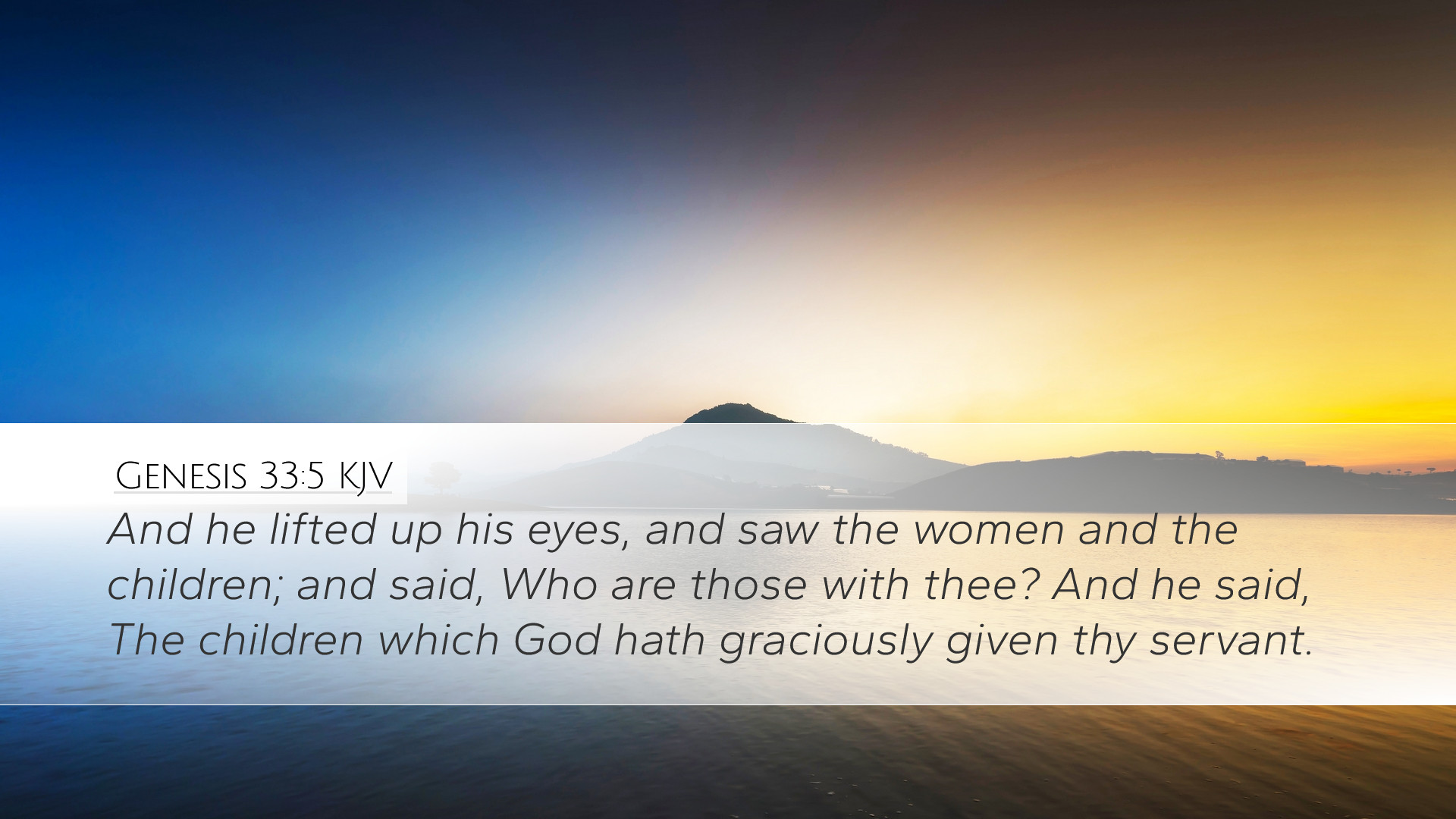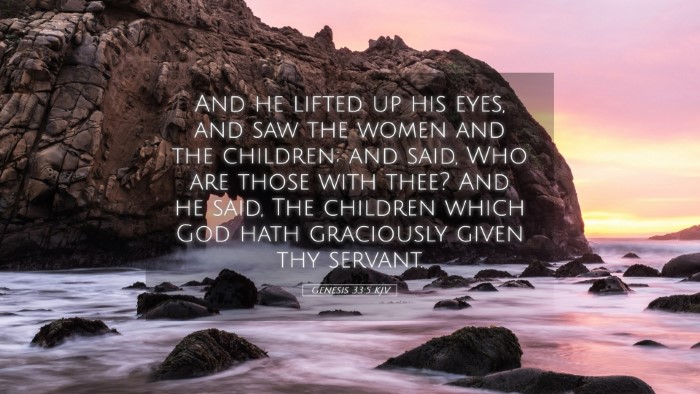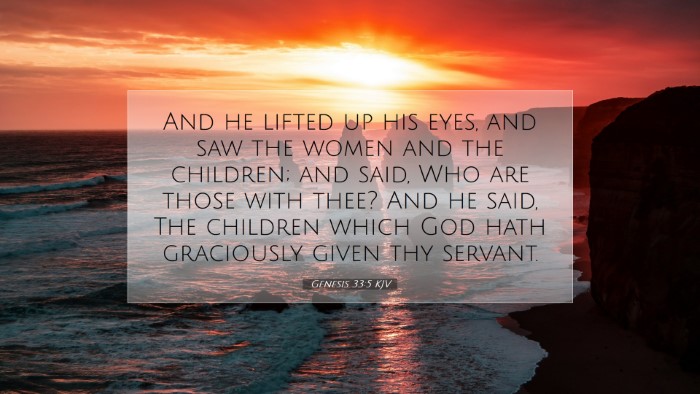Commentary on Genesis 33:5
Verse: "And when Esau lifted up his eyes and saw the women and the children, he said, Who are those with you? And Jacob said, The children which God hath graciously given thy servant."
Introduction
This verse occurs in a pivotal moment of reconciliation between Jacob and Esau after years of estrangement and enmity. It reflects the themes of family conflict, divine providence, and the mercy of God. The initial meeting was fraught with tension, yet it leads to an important restoration.
Contextual Background
To fully grasp the significance of this verse, it is essential to understand the preceding events in Jacob's life. Following a contentious relationship marked by deceit and rivalry, Jacob had fled to avoid Esau's wrath after stealing his birthright and blessing. Now, as Jacob returns to Canaan, he encounters Esau, who meets him with unexpected grace. This context enriches the understanding of the emotional undertones present in their reunion.
Exegesis and Analysis
This verse highlights several key elements worth noting:
- The Lifted Eyes: The phrase "lifted up his eyes" signifies a moment of clarity and recognition. Esau's gaze shifts from potential hostility to familial connection.
- The Inquiry: Esau's question about who is with Jacob demonstrates his interest and concern for his brother's family. This shows a transition from former animosity to a starting point of brotherly affection.
- Divine Favor: Jacob’s response acknowledges God’s providence in granting him a family, referring to them as "the children which God hath graciously given." This statement reflects Jacob's awareness of God's hand in his life. It illustrates a heartfelt acknowledgment of divine blessing in a time of reconciliation.
Commentary Insights
Matthew Henry's Perspective
According to Matthew Henry, this encounter reveals the "remarkable change" in Esau's character, from a brother seeking revenge to one demonstrating graciousness. Henry emphasizes that this change is indicative of God's work in the lives of individuals. Furthermore, he notes that Jacob's humble acknowledgment of his children as a divine gift signifies his development in faith and humility.
Albert Barnes' Observations
Albert Barnes points out that Esau's greeting and inquiry about Jacob's family reflect a softening of heart, signifying the healing of their relationship. He attributes this transformation to a divine intervention, marking it as a critical moment in the reconciliatory process. Barnes stresses that the acknowledgment of God’s grace in providing Jacob's family underscores the theme of reconciliation, illustrating that God can mend broken relationships despite past grievances.
Adam Clarke's Commentary
Adam Clarke draws attention to the significance of Jacob's statement about his children being a gift from God. He points out the humility in Jacob's words, contrasting with the previous self-centeredness that characterized his early interactions with Esau. Clarke indicates that this marks a spiritual maturity and a realization of God's sovereign grace. He also mentions that Esau's question aligns with a hard-fought understanding of familial ties re-established through God's gracious intervention.
Theological Implications
The narrative from Genesis 33:5 carries profound theological implications:
- God's Grace in Reconciliation: The transformation of Esau and Jacob's interaction serves as a reminder of God's ability to effect reconciliation among estranged individuals. This can be seen as a foreshadowing of New Testament themes of forgiveness and reconciliation in Christ.
- The Importance of Family: Jacob's reply underscores the biblical principle of family as a divine gift. It invites reflection on the value of familial relationships in God’s plan and the blessings they provide.
- Recognition of Divine Sovereignty: Jacob’s acknowledgment of God's work in his life invites believers to recognize and give thanks for the blessings in their own lives, attributing them to God’s grace.
Application for Pastors and Theologians
For pastors and theologians, Genesis 33:5 offers rich material for teaching and reflection:
- Emphasize the themes of reconciliation and transformation in homiletical settings. This text serves as a powerful illustration of God’s ability to restore relationships.
- Encourage believers to recognize and name God's work in their own families, fostering gratitude and unity in a church setting.
- Illustrate the importance of humility and the recognition of God's sovereignty in one's life, particularly when navigating conflict.
Conclusion
Genesis 33:5 encapsulates a moment of grace that transcends Jacob and Esau's past grievances. With various commentaries shedding light on Esau's change of heart, Jacob's humility, and divine providence, this passage speaks powerfully to modern readers. It invites reflection on family relationships, the importance of reconciliation, and an acknowledgment of God's gracious gifts. As believers engage with this text, it challenges them to embody the grace shown in this encounter, pursuing peace and reconciliation within their own lives.


